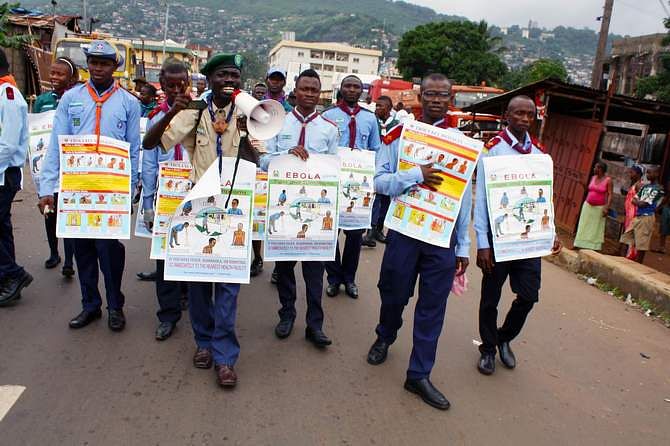Up to 30,000 'eligible for Ebola drugs'
Up to 30,000 'eligible for Ebola drugs'

Up to 30,000 people could have been eligible for drugs in the current Ebola outbreak - if they had been available, a report in Nature suggests.
Experts used data from previous outbreaks to work out how many family members, medics and others would have contact with infected people.
The World Health Organization recently permitted the use of experimental Ebola drugs.
But there are only enough supplies to treat just a few of those infected.
PREVENTING AND TREATING
Official figures suggest more than 1,000 people across west Africa have died from Ebola in the last nine months - a number that is likely to "vastly underestimate the size of the problem" according to the World Health Organization.
And this uncertainly makes it difficult to predict the volume of medicines required to either treat infected people or protect those at risk.
Using data available from previous episodes of Ebola, researchers at the University of Oxford built a statistical model to estimate the number of people who may require medication.
Past infections mostly involved rural populations across central and East Africa - in contrast to this more quickly-spreading outbreak which has reached several urban centres.
Their model suggests around 30,000 people could have gained some protection from drugs or vaccines so far.
And they identified four groups most at risk, listing them in order of urgency:
People who are infected and family members and carers in close contact with them
Medical staff and those involved in funeral practices who have may have prolonged exposure to the virus
Humanitarian workers and support staff
A contingency supply for travellers arriving in non-affected countries.
Dr Oliver Brady, the lead researcher from the University of Oxford, said policy makers and funders needed to make urgent decisions about how best to prioritise these groups.
Analysis: David Shukman, Science editor, BBC News
At first sight, the estimate that 30,000 people might benefit from some kind of drug to resist or fight Ebola is chillingly large. It suggests that the outbreak poses a threat on a scale that many might not have considered possible.
Indeed, the study's authors want this result to provoke governments, research bodies and drugs companies into a more energetic response.
The estimate relies on a host of assumptions so it may be too high or, more realistically, too low. In any event, the study provides the first framework for calculating the likely need for new medicines.
And therein lies the biggest challenge: for most pharmaceutical companies, a potential market of 30,000 is far too small to merit any attention, let alone serious or urgent investment.
So the job of turning experimental drugs into useable products will have to be funded by public authorities and charitable foundations. And, until that happens, the best defence will continue to be very basic, such as making sure the right people have enough rubber gloves and body-bags.
MANY UNCERTAINTIES
Researchers added much more detailed information on how the virus spreads in urban areas and the levels of exposure healthcare workers face would be invaluable in arriving at more accurate numbers.
Experts acknowledge predicting the magnitude of need and how best to deal with the virus is fraught with difficulty in an evolving situation where so many details remain uncertain.
Some question how likely different experimental drugs are to work given most evidence for their use exists in animal tests and concerns exist about how quickly new medicines can be produced.
Prof Jonathan Ball of Nottingham University said certain approaches may have more impact than others: "If the aim is to prevent the disease occurring in humans, then history tells us that our best bet is vaccination.
"But that isn't going to happen tomorrow; and it wont solve the current problem in west Africa.
"I maintain that the only way we are going to bear this ever-worsening outbreak is by education, public engagement, better healthcare provision and stringent infection control."